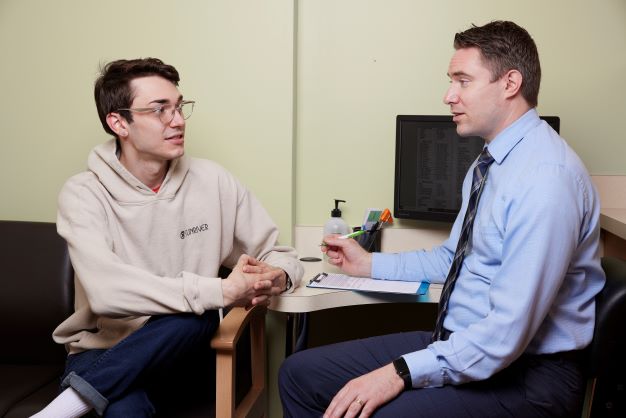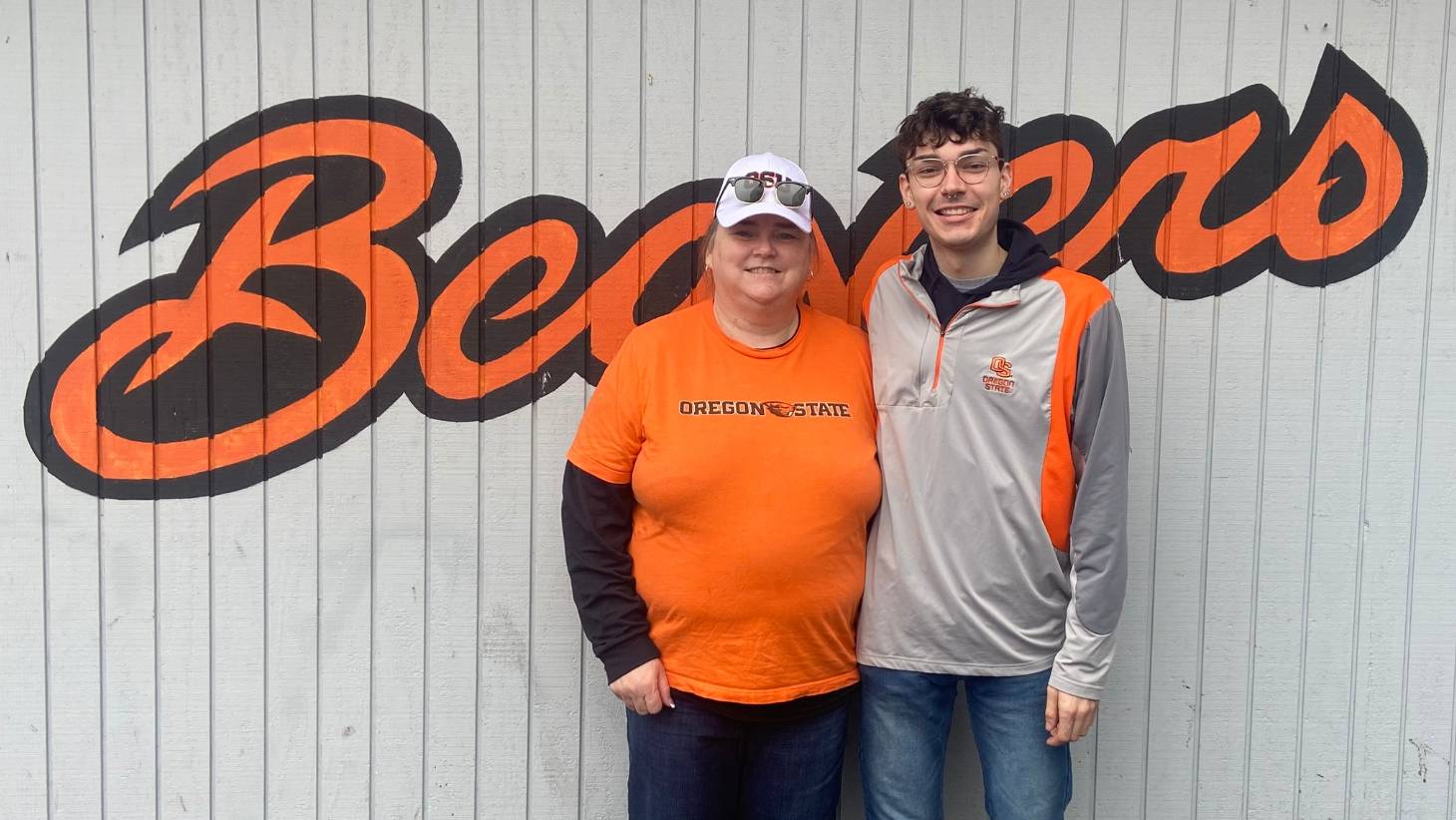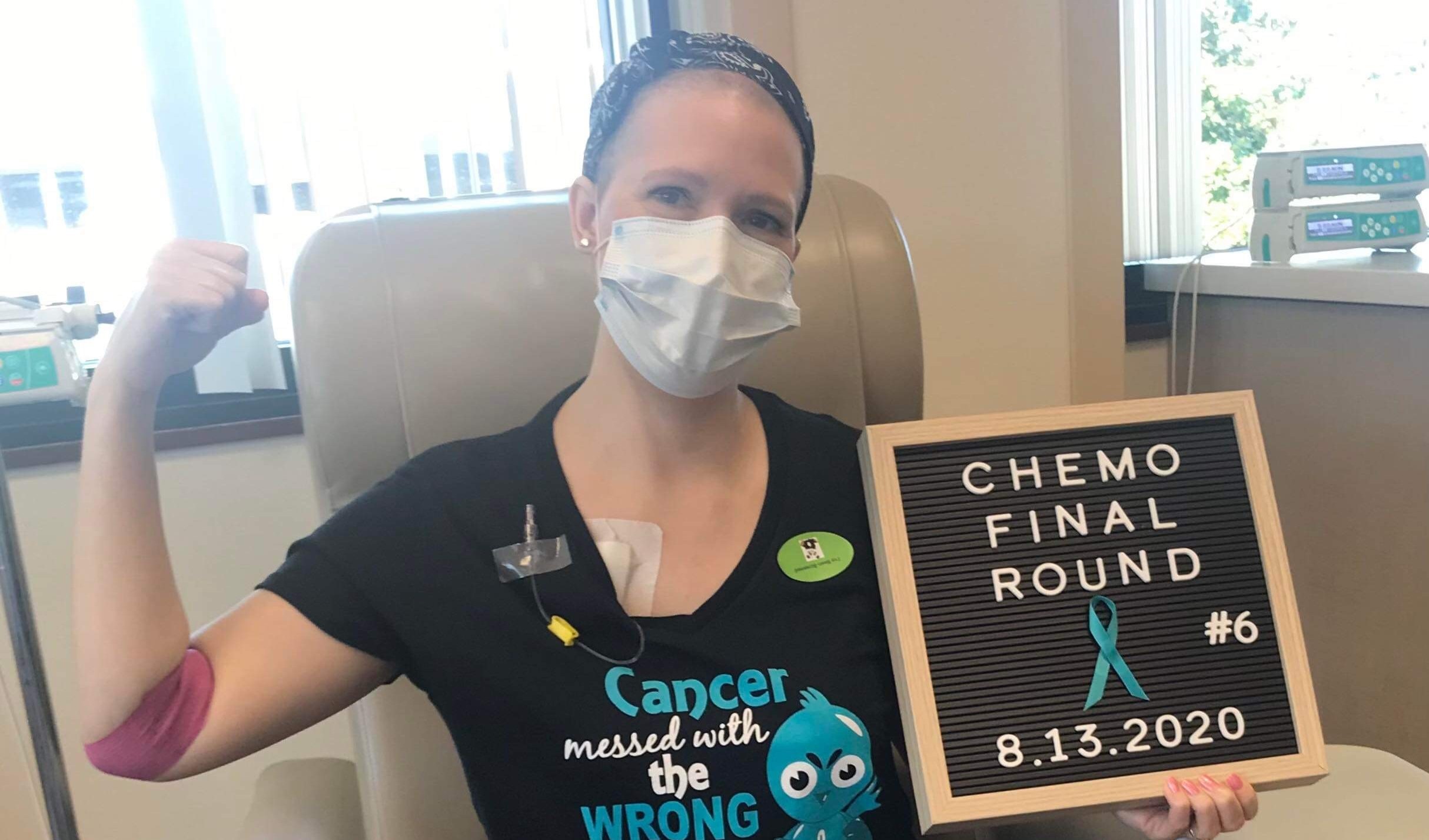Starting college should be one of the most exciting times in a young adult’s life. A time of new knowledge, experiences, friendships, and memories. While all of those things happened for Joel Wiest, he can tell you that it certainly wasn’t in the way he had envisioned.
After spending a year at Chemeketa Community College in Salem, Oregon, Joel decided to enroll at Oregon State University in 2019 to pursue a degree in Human Resources Management. At the time, the initial draw for choosing that particular school was because he had a few friends already attending there. However, he made more friends quickly and even joined the Lambda Chi Alpha fraternity.
Campus life seemed to be going well until it wasn’t. Something didn’t feel quite right physically, so Joel visited the on-site student health services to get checked out. “They didn’t have an ultrasound machine there,” he recalls, “so I was sent over to Corvallis Clinic since they work closely with each other.” It was there he learned his imaging test results showed what appeared to be testicular cancer.
Dealing With An Unexpected Cancer Diagnosis
The moment he was diagnosed is still pretty fresh in Joel’s mind. “I was extremely distraught and didn’t really think it could be happening to me,” he said. “It felt so fast, having to schedule appointments to see doctors. I was terrified I was going to lose my life.”
He remembers the whole situation as being stressful and a bit of a whirlwind. Joel’s urologist wanted to schedule surgery only three days after receiving the test results. But with school just starting, Joel had it scheduled for a Friday in early October so he could finish out the first week of classes.
A biopsy is a procedure that takes a sample of the tumor so it can be tested to determine whether it is cancerous. However, there’s a risk of spreading the cancer during a testicular biopsy, so it wasn’t done prior to the surgery for Joel.
After his surgery to remove the tumor, Joel received more details and confirmation that it was cancer. Specifically, it was considered a stage II (2) tumor. Stage II testicular cancer means the cancer cells have invaded nearby lymph nodes. These affected lymph nodes were also removed during surgery.
Managing a Setback With Help From WVCI
Six months after surgery, Joel’s life changed again. “Everything was fine up until March of 2020,” he says about his follow-up appointment. “I found out I had a couple of lymph nodes they were still concerned about. That’s when I started chemo — and it was kind of crazy because school was still going on. But then COVID literally happened…”
With lockdowns and restrictions starting to become the norm due to the pandemic, Joel eventually had to start doing a lot of things alone, including driving himself to and from his oncology appointments with Dr. Keith Wells, an oncologist at WVCI.
Even though Joel’s parents and stepmom live in Oregon, COVID made it hard to have frequent visits. When they did come, time was spent outdoors, 6 feet apart, often to eat a meal. It wasn’t ideal. Joel needed more support on a day-to-day basis.
Support During the Side Effects of Cancer Treatment
Joel continued to hold down his part-time job while in cancer treatment. This was no doubt a challenge considering how treatments made him feel. One of the side effects of cancer treatment that hit Joel hard was hair loss.
While not all chemotherapy patients lose their hair, Joel did, and it was more painful than expected. The pain and itchiness he felt during the process were enough to make him want to shave his head and get it over with. “I just didn't want to deal with it, and I just knew it was going to have to happen at some point because it started coming out,” he says. “A friend told me having control of the situation was more important, I think, than losing it over time because then you choose when it’s done. And I just chose, so I just did it.”
His Dutch Bros. Coffee co-workers were there to offer some much-needed support when he needed it most. Although Joel doesn’t care for the clichés that sometimes come with a cancer journey, like when others shave their own head for a friend, he was deeply touched by the sweet gesture of five co-workers who did just that.
He also knew he was in good hands with Dr. Wells and all the oncology nurses who treated him and helped him manage side effects as they came up. “The care and support they provide is unmatched; they really cared about my needs,” he says.
One Last Cancer Treatment Decision
One step at a time, Joel was that much closer to regaining the normalcy he was missing. All he had to do was stay focused and take it in stride.
Finally, in December 2020, nine months after chemo began, Joel needed to make one last decision regarding his treatment. It was recommended that he have surgery to remove the two concerning lymph nodes. “It was optional because one of them was 0.1 centimeters above the range,” he said. “Dr. Wells wasn't pushing me to do it, but he was also like, ‘You're younger; we could do this now.’” Joel agreed that this was the best time, too. Being in his twenties, he preferred going under a full anesthetic surgery sooner rather than later when it might be harder to recover.
To remove the lymph nodes, Dr. Sudhir Isharwal, MD of OHSU Urology, used robotic technology called the da Vinci surgical system. This machine uses four thin robotic arms that enable the surgeon to operate with enhanced precision and control. With this technology, surgeons can offer a minimally-invasive option resulting in less scarring and downtime.
As an extra precaution, all 57 lymph nodes in the area were removed. This was done in hopes of reducing the chance of Joel’s cancer returning.
Moving Forward Now That Cancer Is Behind Him
Joel is cancer-free now and feeling much better these days. Although his cancer journey is still something he thinks about often, he’s glad to be in remission.
When asked about what he would tell someone who received a similar diagnosis, he had this to say: “I would tell the person, don’t overthink the future. Worry about what needs to be done, worked on right now. Focusing your energy on unforeseen events can be exhausting, especially if it is not what you expected. Take the time you need for yourself; this is your journey, no one else’s. What you need is important. Don’t put it off because you think you’re a burden; you are loved.” He also notes how important it is to take time to see to your health needs when you are able.
Today, you can find Joel working as a medical office specialist at the Corvallis Clinic, located in the Willamette Valley area. Ironically, right across the street from where he received treatment. He plans on finishing his MBA in June 2025.
If you or a loved one has been diagnosed with testicular cancer, learn how Willamette Valley Cancer Institute and Research Center can help.



